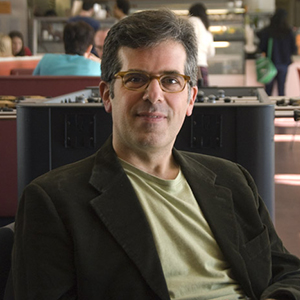2013 Scotiabank Giller Prize Winner
Lynn Coady
Hell Going
2013 Longlist
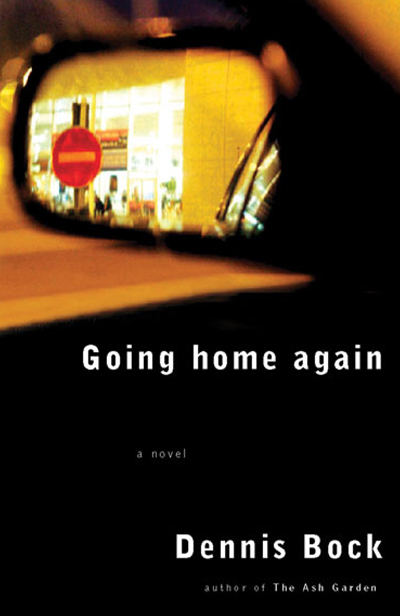
Going Home Again by Dennis Bock
On the Friday evening before Kaj Adolfsson was killed, I was actually feeling pretty good about things. I had just landed in Madrid, which was home, and a big round sun the color of orange sherbet was three-quarters gone in a fine late-summer sky. I was coming off a strange year, a bit battered and bruised, but my circumstances were looking up. The language business was going well, my love life had crawled back up out of a deep dark hole, and the day after tomorrow I was hosting my daughter’s thirteenth birthday. My problems seemed at that moment destined to disappear like that setting sun. And then, as I watched the city come into view from the backseat of my taxi, my brother’s wife called with the news that set everything moving off in the wrong direction.
“And you haven’t heard from him since?” I said, leaning forward and pointing to the dashboard radio. When the cabdriver reached for the dial to turn down the volume, I saw the little stub on his right hand where his index finger used to be.
“That’s why I’m calling,” Monica said. “I thought maybe he’d called you.”
“No. Nothing. I just got in. There were no messages.”
My brother and Monica were in the middle of a divorce full to overflowing with discord and grievance. Over the past year they’d told me in so many words that they each wished the other had never been born. Now she was on the phone telling me Nate’s sailboat had been found crewless and adrift thirty miles south of Naples, Florida.
“The Coast Guard contacted me three hours ago. I don’t know what to think. That stupid boat was his baby.”
“Is his baby,” I said, maybe a little too forcefully.
“He’s two days overdue, Charlie. He was supposed to pick up the kids yesterday. Of course he doesn’t show up. Now they call telling me his sailboat’s under tow and do I know the whereabouts of my husband? The partners at his office haven’t heard from him, either. No one knows a thing. You can imagine what this is doing to my head right now.”
I did what I could to convince Monica that Nate was probably fine and all we could do was sit tight, he’d call soon enough. I’d be back in three days, on Monday, in any case. But after slipping the phone back into my pocket, I wondered if he wasn’t already somewhere over the Atlantic en route to finishing up the business we’d left hanging between us. He was capable of much more than I could ever understand, that much I knew by then, and this sort of grand gesture—popping up in Madrid on the weekend of my daughter’s thirteenth birthday—provided the retributive drama favored by a man on the verge of losing his family. I ran through as many likely explanations as occurred to me in the time it took to get into the city. But half an hour later, when the cabbie dropped me at the door of the Mesón Txistu, that feeling of unease still hung over me.
Men and women were sitting and standing in small groups taking aperitifs at the front bar when I walked in. I nodded to the bartender and continued up the stairs into the back room and found Isabel and Ava, our daughter, sitting at the table beneath the bull’s head on the south wall, a pitcher of ice water between them. Ava’s hair was shoulder length and chestnut brown, like her mother’s, and she looked, despite my northern complexion, every bit the Spaniard. When she turned and saw me at the far end of the room, she got up and met me between tables, throwing herself into my arms. I gave her a spin and a hug.
“How was your flight, Daddy? How was Ireland ?”
“It was good,” I said, slipping out from under a shoulder strap. I handed her the lighter of two carryon bags, the one loaded with presents. “You’re looking great. How’s Mom? She okay?”
“She’s fine,” she said, then led me by the hand to where Isabel sat, wearing a smile I wasn’t quite able to pin down.
“Good to see you,” I said, stooping to kiss both cheeks.
I didn’t recognize the dress she was wearing that night. It was a green-and-white summery number that showed those great arms of hers, shaped and tanned at the tail end of an active and outdoorsy season. We’d been separated for more than a year now, and the fact that she had a man in her life was old news. Through a family friend named José, whom I’d known since my earliest days in Madrid, I’d heard more about him than I needed to know—for instance, that he was a constitutional lawyer in the Spanish Supreme Court and, at forty-two, the youngest justice in the history of the institution. He owned a house in Ibiza, as well as the flat in Paris I’d visited the previous Christmas. As far as I knew, he had no kids and lived the kind of life that stressed-out parents like to dream about.
The waiter appeared, helped me with my seat and left us with three leather-bound menus. Isabel was sitting directly across from me, Ava to my right.
“Are you feeling okay?” Isabel said. “You look worried.”
“Just glad to be back,” I told her. “No problem.” We usually spoke Spanish when the three of us were together. But for some reason we spoke English that night.
“You know Dad always looks tired, anyway,” Ava said, opening her menu. “It’s all that thinking he does. Right, Dad?”
“There you go,” I said. “Nail on the head.”
“I hope no one drops dead at my party,” Ava said.
“The heat’s killed forty-one people in France this summer. Can you believe that?”
“That’s horrible,” I said.
“Mostly old people, I know. They were talking about it on the news this morning.”
“At least it’s cooler up there in the mountains,” I said.
We’d celebrated Ava’s birthday at a friend’s house in the Madrid sierra, thirty-five minutes north of the city, for the past ten years. I’d flown into Dublin from Toronto that morning and spent the day putting out fires at the Bellerose Academy—one of the language schools I owned and operated—before hopping a shuttle over to Madrid for the occasion. Since splitting up the previous summer, her mother and I had managed to keep the lawyering to a minimum. Now, whenever we found ourselves in the same room together (which wasn’t very often), we did our best to keep the edge out of our voices. In calmer moments we’d agreed that the success we’d have in raising our daughter would rise or fall in direct relation to the number of conflicting issues we chose to leave by the wayside. There just weren’t enough hours in the day. Choose your battles. Wasn’t that the best advice you could ever give or receive? By then it wasn’t a question of solving anything or determining who was in the wrong, as too often someone was, but managing to move forward with our dignity intact.
“Grandpa’s going to talk your ear off about his gardening. He’s on this new thing. He’s ordering papaya seeds from Brazil or something.”
“And you?” I said, leaning forward to kiss her forehead.
“What’s up with you? I’m sure you’ve got a doozy waiting for me.”
“Oh, yeah,” she said, her big brown eyes glowing.
—
Excerpted from GOING HOME AGAIN by Dennis Bock. Copyright © Dennis Bock, 2013. Excerpted by permission of HarperCollins Publishers Ltd. All rights reserved. No part of this excerpt may be reproduced or reprinted without permission in writing from the publisher.

The Orenda by Joseph Boyden
We had magic before the crows came. Before the rise of the great villages they so roughly carved on the shores of our inland sea and named with words plucked from our tongues—Chicago, Toronto, Milwaukee, Ottawa—we had our own great villages on these same shores. And we understood our magic. We understood what the orenda implied.
But who is at fault when that recedes? It’s tempting to place blame, though loss should never be weighed in this manner. Who, then, to blame for what we now witness, our children cutting their bodies to pieces or strangling themselves in the dark recesses of their homes or gulping your stinking drink until their bodies fail? But we get ahead of ourselves. This, on the surface, is the story of our past.
Once those crows flew over the great water from their old world to perch tired and frightened in the branches of ours, they saw that we had the orenda. We believed. Oh, did we believe. This is why the crows, at first, thought of us as little more than animals. We lived in a physical world that frightened them and hunted beasts they’d only had nightmares of, and we consumed the mystery that the crows were bred to fear. We breathed what they feared. But they watched intently, as crows are prone to do.
And when they cawed that our magic was unclean, we laughed, took a little offence, even killed a few of them and pulled their feathers for our hair. We lived on. But that word, unclean, that word, somehow, like an illness, like its own magic, it began to grow. Very few of us saw that coming. So maybe this is the story of those few.
HUNTED
I awake. A few minutes, maybe, of troubled sleep. My teeth chatter so violently I can taste I’ve bitten my swollen tongue. Spitting red into the snow, I try to rise but my body’s seized. The oldest Huron, their leader, who kept us walking all night around the big lake rather than across it because of some ridiculous dream, stands above me with a thorn club. The weight these men give their dreams will be the end of them.
Although I still know little of their language, I understand the words he whispers and force myself to roll over when the club swings toward me. The thorns bite into my back and the bile of curses that pour from my mouth make the Hurons convulse with laughter. I am sorry, Lord, to use Your name in vain.
They’d all be screaming with glee, pointing and holding their bellies, if we weren’t being hunted. With a low sun rising and the air so cold, noise travels. They are clearly fed up with the young Iroquois girl who never stopped whimpering the entire night. Her face is swollen and, when I see her lying in the snow, I fear they killed her while I slept.
Not long ago, just before first light, we’d all paused to rest, the leader and his handful of hunters stopping as if they’d planned this in advance, the pack of them collapsing against one another for the heat. They whispered among themselves, and a couple glanced over at me. Although I couldn’t decipher their rushed speech, I sensed they talked of leaving me here, probably with the girl, who at that moment sat with her back to a birch, staring as if in a dream. Or maybe they talked of killing us. We had slowed them down all night, and despite trying to walk quietly I’d stumbled in the dark through the thick brush and tripped over fallen trees buried in the snow. At one point I removed my snowshoes because they were so clumsy, but then sank up to my hips in the next steps, and one of the hunters had to pull me out, biting me hard on the face once he’d accomplished the deed.
Now the snow covering the lake glows the colour of a robin’s egg as sunlight tries to break through cloud. If I live through this day I will always remember to pay attention to the tickle of dryness at the back of my throat at this moment, the feeling of a bad headache coming. I’ve just begun to walk to the girl to offer her comfort, if she’s still alive, when a dog’s howl breaks the silence, its excitement in picking up our scent making me want to throw up. Other dogs answer it. I forget how my toes have begun to blacken, that I’ve lost so much weight I can barely support my gaunt frame, that my chest has filled with a sickness that’s turned my skin yellow.
I know dogs, though. As in my old world, they are one of the few things in this new one that bring me comfort. And this pack’s still a long way away, their voices travelling easy in the frozen air. When I bend to help the girl up, I see the others have already disappeared into the shadows of trees and thick brush.
My terror of being left behind for those chasing me, who will make sure my death is slow and painful, is so powerful that I now weigh taking my own life. I know exactly what I must do. Asking Your divine mercy for this, I will strip naked and walk out onto the lake. I calculate how long all this will take. It’s my second winter in the new world, after all, and my first one I witnessed the brutality of death by freezing. The first ten minutes, as the pack races closer and closer, will certainly be the most excruciating. My skin will at first feel as if it’s on fire, like I’m being boiled in a pot. Only one thing is more painful than these early minutes of freezing, and it’s the thawing out, every tendril of the body screaming for the agony to stop. But I won’t have to worry about that. I will lie on the frozen lake and allow the boiling cold to consume me. After that handful of minutes the violent shaking won’t even be noticed, but the sharp stabs of pain in the forehead will come, and they will travel deeper until it feels my brain is being prodded with fish spines. And when the dogs are within a few minutes of reaching me, I will suddenly begin to feel a warmth creeping. My body will continue its hard seizures, but my toes and fingers and testicles will stop burning. I will begin to feel a sense of, if not comfort, then relief, and my breathing will be very difficult and this will cause panic but that will slowly harden to resolve. And when the dogs are on the lake and racing toward me, jaws foaming and teeth bared, I will know that even this won’t hurt anymore, my eyes frozen shut as I slip into a sleep that no one can awaken from. As the dogs circle me I will try to smile at them, baring my own teeth, too, and when they begin to eat me I won’t feel myself being consumed but will, like You, Christ, give my body so that others might live.
This thought of giving, I now see, lifts me just enough to pick up the girl and begin walking away from the lake’s edge. After all, if she’s alive, won’t her people—my pursuers—consider sparing me? I will keep her alive, not only because this is what You demand but also to save myself. The thought of betraying Your wishes feels more an intellectual quandary than what I imagine should physically cause my heart to ache, but I’ll worry about that later. For now I follow the others’ footsteps as best I can, my thick black robe catching on the branches and nettles, the bush so thick I wonder how it is that the men I follow, and those who follow me, are not part animal, contain some black magic that gives them abilities beyond what is natural.
You seem very far away here in this cold hell, and the Superior’s attempts to prepare me before I left France, before my journey to this new world, seem ridiculous in their naïveté. You will face great danger. You will most certainly face death. You will question Jesus’ mercy, even His existence. This is Lucifer whispering in your ear. Lucifer’s fires are ice. There is no warming your body and your soul by them. But Superior doesn’t have any idea what true cold is, I realize, as I allow myself and the girl to be swallowed by the darkness of trees that the bitter sun fails to penetrate.
—
Excerpted from THE ORENDA by Joseph Boyden. Copyright © Joseph Boyden, 2013. Excerpted by permission of Penguin Canada Books Inc. All rights reserved. No part of this excerpt may be reproduced or reprinted without permission in writing from the publisher.
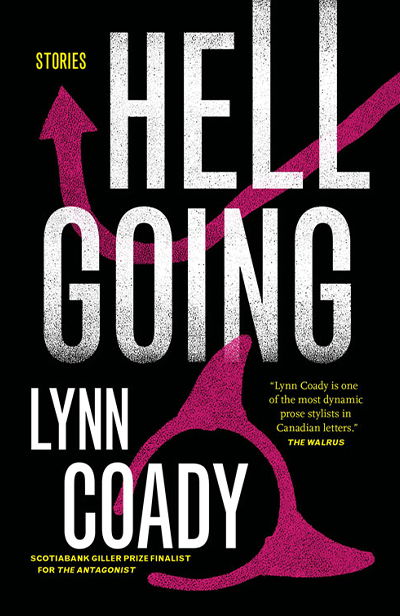
Hellgoing by Lynn Coady
Wireless
Jane salutes you from an age where to be an aficionado is to find yourself foolishly situated in the world. Where to care a great deal about something, no matter how implicitly interesting it may be, is to come across as a kind of freak. It’s interest — inordinate interest — in something seemingly arbitrary, having little to do with you or the context you inhabit. Beanie Babies, say, or Glenn Gould. Jane once met a person who insisted he was “crazy about Glenn Gould,” who owned all these rare and exotic recordings. Called himself a glennerd, happily, smugly. Did other Gould fanatics call themselves glennerds? Jane wanted to know. The glennerd shrugged, didn’t care. It wasn’t about other glennerds, Jane saw, it was only about this particular glennerd, him and his fascination. This person was not a musician. Didn’t listen to classical music, as a rule.
It’s that people get fixated. People take a notion in their head. Jane, not her real name because all this embarrasses her somewhat, once had a thing for a cartoon called Robo-friendz. She was too old for Robo-friendz — sixteen, she was supposed have things for men with tawny chests, bulging crotches and leonine hair — but no, only the Robo-friendz, for about a year or so, sent her into a daily couch-catatonia. No one in her family was allowed to talk to her when Robo-friendz was on. She probably drooled as she watched, as slackly comforted — comfortably absented — as a baby nuzzling breasts. These are the obsessions that turn your brain somehow on and off at once. They come regularly, each more arbitrary than the next. Once it was mushrooms, especially the kind that look like tiny, mounted brains. Once it was an all-male medieval choir from Norway. Once it was a website with a dancing hamster who sang a different show tune every week. She checked it faithfully each Monday morning, like a prayer to greet the dawn. It is not like alcoholism, it is not like addiction. But it’s wrapped up with that — the pathetic psychology of it. The everlasting need to flee whatever there is to be fled from. Fortunately, one does not need to dwell on this knowledge, one is discouraged from beating oneself up in Jane’s circles. That’s good to know — you’re permitted to comprehend and yet ignore such things — that’s nice, that helps.
It started before the dream. A woman walks into a bar. Starts like a joke, you see.
A woman walks into a bar. It’s Toronto, she’s there on business. Bidness, she likes to call it, she says to her friends. Makes it sound raunchy, which it is not. It’s meetings, mostly with other women of her own age or else men about twenty years older. Sumptuous lunches in blandly posh restaurants. There is only one thing duller than upscale Toronto dining, and that’s upscale Toronto dining with women of Jane’s own age, class and education. They and Jane wear black, don’t go in for a lot of jewellery, are elegant, serious. The men are more interesting. The men were once Young Turks of publishing.
They remember the seventies, when magazines were run by young men exactly like themselves — smokers, drinkers — and these men have never found one another remotely dull — not in the least. Some of them used to be in rock and roll bands. They wear their hair a little shaggy around the ears, now, a silvery homage. Some of them have even managed to remain drunks. This is something a lady discovers quickly over lunch: which of these silver foxes are recovered, and which are still sloshing around down there in the dregs. Wine with lunch, Jane? Oh well, perhaps I’ll join you. Half litre? Heck, why not a full one, how often do you get into town? Martini to round out dessert? Specialty coffee? At this point, both sets of eyes are liquid, glinting friendly light.
If it doesn’t happen at lunch, she’ll go to a bar, later in the day, after dinner. She has a sense of decorum. She can wait until after dinner, especially when she’s on Vancouver time, three hours earlier than this grey, weighty city.
So a woman walks into a bar. Meets a man — it’s a cliché. The man is also a drunk, also an out-of-towner, also alone. After the first round, they are delighted to discover they come from precisely opposite sides of the continent. Oh, ho ho ho. Delighted in that dumb, convivial way that drinking people have. It’s not like it can be considered a coincidence, being from opposite sides of the country. But, oh, ho ho ho, they find it an inexplicable delight. To be meeting up right here in the middle.
His accent was a giveaway from the start. His quaint, alien accent, the way he can’t pronounce th, it’s twee, she finds it cute. You’re not supposed to find Newfoundlanders cute, they bristle at that. Some people are the same way about Newfoundlanders as others are about Beanie Babies and Glenn Gould. But his name is Ned, he’s burly, has a beard and is a fiddler. I mean, come on.
In town to play some bars with his five-part folk/trad outfit. They specialize in filthy songs, he tells her, dirty ditties. Smutty traditional tunes from days gone by, baroque with double — and sometimes single — entendres. Most people don’t want to know that cute Newfoundlanders and their Irish antecedents went around singing things like: Come and tie my pecker round a tree, round a tree-o / come and tie my tool around a tree. But, says Ned, they did, and do. Ned bears himself up like a scholar as he tells her this. As the evening unspools, he sings snatches from his repertoire, and indeed most of it has to do with snatches in some way or another. The only one she is able to remember afterward is a song that kept ending with the refrain “bangin’ on the ol’ tin can.”
“I never heard it called that before.”
“We are a colourful people,” Ned had agreed.
Ned wanted to go home with her — to her hotel and not his, because he was sharing his room with the accordion player. But when that idea was vetoed by the unenticed Jane — he was too burly, too bearded for her sleek tastes — he recommended they at least keep in touch. So she took his phone and email.
“If you’re ever on the Rock,” he’d offered with bourboned sincerity.
—
From HELLGOING by Lynn Coady. Copyright © Lynn Coady, 2013. Excerpt reproduced with the permission of House of Anansi Press. www.houseofanansi.com. All rights reserved.
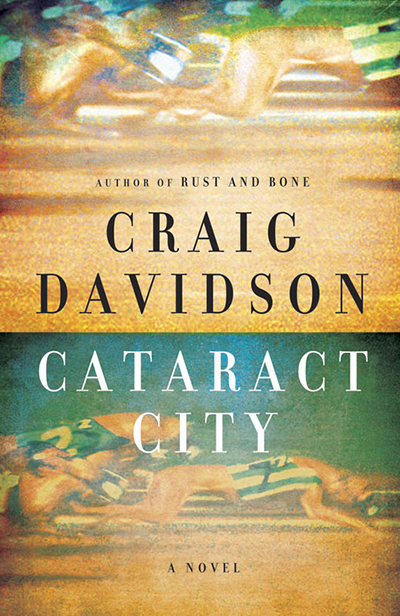
Cataract City by Craig Davidson
That first was endless, even more so than those long-ago nights in the woods with Owen when the wind hissed along the earth and the darkness was full of howling. In the woods an animal might rip you to shreds, sure, but it had no goal other than to protect itself and its offspring. The Kingston Pen housed animals who’d flatline you for looking at them cockeyed or breathing their air.
My cot felt no thicker than a communion wafer, coils cork-screwing into my spine. Penitentiary darkness was different than the outside-the-walls variety. A prison never achieves full black: security lamps forever burning behind mesh screens in the high corners of the cellblock, hourly flashlight sweeps. Your eyes become starved for true night—anything is better than granular, gummy semi-dark where shapes shift, half glimpsed, at the edges of your sight.
Still, you get used to it, in time. You get used to everything. Then comes that last night. We’d talk all about it, you know?
Some guys had been in and out a few times; it didn’t mean as much to them. But for most of us it was . . . listen, it’s like my buddy Silas Garrow says: We all owe, and we’re all paying. What else is prison but the repayment? Then they set you loose. But some part of you figures you haven’t quite paid enough. You’ve paid what the law demands, sure, but some debts exist beyond that. Blood dues, you could say. And those aren’t collected in the usual way, are they? Those ones tiptoe up behind you like a sneak-thief.
That last night I lay in my cot—a new one, still prickly—thinking I’d die. The dread certainty entombed itself in my skull. It wouldn’t be anything crazy, nobody was going to stab me in the neck with a sharpened toothbrush or anything like that. No, it’d be a boring and commonplace kind of death. An itty-bitty shred of plaque might detach from an artery wall, surf through my bloodstream, lodge in a ventricle and kill me dead. That would be fair and right, too, because I’d killed a man myself. A fair one-to-one transaction, blood cancelling blood. Fairer still that it should happen in the hours before my release. You’ve got to figure that’s just the way such debts get repaid: with a gotcha.
I must’ve sweated off half my body weight that night. You could’ve wrung my cot like a sponge. When the first wave of sunlight washed across the cell floor . . . to be honest, I didn’t know what to make of it. I could still die two steps outside the gates, I guess. That’d meet the accepted terms just as well.
And so it happened that one afternoon, nearly eight years after I’d scrubbed with delousing powder and donned an orange jumpsuit, my prison term ended. I collected the items I’d been admitted with: $2.32 in change, half a roll of cherry Life Savers stuck with pocket lint. I shook a few quarters out of the manila envelope and slid them into the prison’s pay phone
It was a surprise to everyone who I called. Truth? I surprised myself.
Exiting the penitentiary was a shocking experience. Maybe it’s meant to be.
Two guards led me down a tight hallway, hands cuffed. A steel door emptied into a small yard, its clipped grass shadowed by the high wall. Jesus, grass.
One guard removed the cuffs while the other stood with a shotgun at port arms. I rubbed my wrists—not because the cuffs were tight but because I’d seen it done in films when the jailers took the cuffs off a criminal. Which I was. The fact cold-cocked me. For the past eight years I’d been a red fish swimming in a tank with other red fish. But I’d be freed into a sea of blue fish, law-abiding fish, and I was fearful I’d stick out—the prison bars permanently shadowing my face, even in clean sunshine.
The guards opened another door set into the grey wall. I walked between them. No tearful goodbyes. The door locked softly behind me. I stood in an archway ten feet from a main road. The Saint Lawrence Seaway was a strip of endless blue to the south. Cars motored up and down the hill, entering and exiting my sightline with strange suddenness. I hadn’t seen anything move so fast in eight years; my eyes needed to adjust.
I took a few tentative steps. A tight group of onlookers clustered on the far sidewalk, gawking at me. I’d heard about these people; they hung around the gates hoping for this exact sight—the first fumbling steps of a long con as he squinted into the new sunlight, his legs trembling like a newborn foal’s.
Ghouls. I ought to flip them the bird! But the idea of doing so filled me with shapeless fear—I pictured one of them making a call, then the prison doors opening to swallow me up again.
What charge? A red fish failing to swim submissively amongst the blue fish?
Owen leaned on the hood of his Lincoln, his right knee—the bad one—slightly bent to take the weight off.
“Thanks for coming,” I said.
His face tilted upwards, smiling at the sun. “Hop in, man.”
The Kingston Pen stood atop a hill, a monstrosity of conical turrets and razorwire. I’d forgotten how beastly it looked from the outside. I unrolled the car window. Wind curled over the earth, pulling up the smell of springtime grass. I inhaled deep, dizzying breaths.
Owen drove down a switchback and hit the highway. My breath came in a shallow rush—I was nearly hyperventilating. Stands of Jack pine blurred into a green wall topped by a limitless sky. I hadn’t seen unbroken sky in so long. It’s too easy to forget the sheer size of the world. We didn’t speak at all until we hit Cataract City limits. It wasn’t uncomfortable.
“So,” Owen said, “do I need to watch my ass?”
“Well, old buddy, it’s like this. Every night for the past eight years I’ve lain in bed with a three-hundred-pound schizo squealing in his sleep underneath me. You figure I’d want to wrongfoot you if it meant winding up back with all that?”
Owen said: “Fair enough.”
We reached our old street, driving past the house Owe used to live in. Not much had changed. The cars were rustier. I got out, then leaned in through the open window. “There’s something I’ll want to talk to you about.”
“I thought we just settled that.”
“Yeah, we did. Dead issue. This is something else.”
“Remember what side of the law I’m on, Dunk.”
I cocked my head. “Aren’t we on the same side?”
He gave me a quick half-smile. “Of course, same side. Run it by me any time.”
—
Excerpted from CATARACT CITY. Copyright © 2013 Craig Davidson. Published by Doubleday Canada, a division of Random House of Canada Limited. Reproduced by arrangement with the Publisher. All rights reserved.
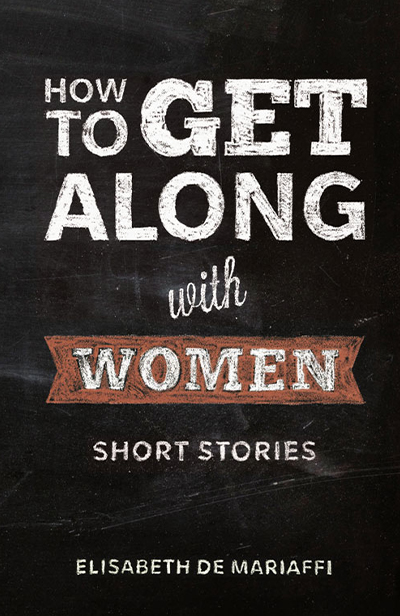
How to Get Along With Women by Elisabeth de Mariaffi
1.
Zelda comes up the laneway on her bicycle, going slow because it’s dusty and because sometimes a pickup pulls out quick, the driver not expecting anyone to be walking or cycling way out here. She can see Tim about halfway down the drive working on the Ranger, his head down in the engine and she leans her bike against the fence and takes her schoolbag, which was hanging across her chest for the ride, and lifts it over her head and lets it hang from just one shoulder and walks up behind him.
I need to ask you a favour.
He doesn’t look up. He says, Pass me that screwdriver there, babe.
Zelda hands him the screwdriver. Seriously. Tim.
He pulls his head and shoulders out from under the hood and turns, flips his chin at her.
Take your shirt off.
Tim. She steps toward him a little and rocks back and forth on her heels.
What?
I need something.
So do I, baby.
I need you to do something for me.
He puts the screwdriver down, leans his head down too.
Lifts up his eyes to look at Zelda. You know you’re no fun.
He’s squinting. There’s a lot of cloud but it’s bright cloud. Zelda doesn’t answer right away and he picks up the screwdriver again and goes back to work on the V belt. There’s some wind and the hood shakes a little, propped up there. Tim stays bent over. Zelda wonders if the wind were strong enough, could the hood fall down on his shoulders.
Tim lived with them, Zelda and Mary, for six whole months back in the winter and spring. He used to take Max for walks and he let Zelda tag along and showed her how to get Max to drop one stick before you throw another.
He got up and made macaroni and cheese for breakfast when Mary was out working late the night before and once when he was rolling up a joint on the kitchen table, Zelda knocked over a glass of milk and soaked his rolling papers and he didn’t even lose his shit.
Zelda says, I need you to drive me up north.
Fuck. Gimme that impact driver.
She finds it and gives it over.
I want to see where I was born.
Who knows where you were born, Tim says. He strips the belt out nice and clean, tosses it down, reaches back for the new one. Zelda picks it up and hands it to him. She doesn’t say anything for a while. Tim’s shoulders rock a little.
Tim.
You know I’m not even fucking your mom anymore. Go ask someone else. Ask Ray.
Ray’s a jackass, Zelda says. That makes Tim feel okay and he brings a greasy hand up to rub his beard and hide it.
Ray brings over these big cheap cowboy steaks and pretends like they’re something good, Zelda says. Mary can’t even stand him half the time. She just needs someone around to, I don’t know.
I know, Tim says. I know what she needs him for.
They stand there a minute with Tim still leaning under the hood but he looks at her and his hand drops and he bounces the impact driver against his thigh a few times. Mary says Thunder Bay.
Screwdriver.
Zelda gives it to him. His shoulders give a last hard shudder. He straightens up and stretches his neck to the side, reaches for the prop and lets the hood fall back into place.
What do you really want to go up to Thunder Bay for?
I’ll fuck you, Tim. If you take me.
Tim throws his tools into the box and he latches it and turns around and points a finger at her. No you won’t. You say you will but you won’t.
I guess.
You guess.
You’re just too old for me, Tim.
They walk around the back of the house and up onto the porch. He has a big wooden table up there under the overhang and he slides the toolbox under the bench and they sit down. He takes a booklet of Zig-Zag out of his shirt pocket and raps the end of it against the tabletop and Zelda opens up her bag and takes out her stuff.
So? Zelda says.
So what? You got any tobacco, or just that shit?
Take me driving, Tim, Zelda says. You love my shit.
She’d been down to Turkey Point with Lorna Gallant and some boys they know. This was a few weeks earlier. One of the boys had a sky blue Impala and they parked it at the bottom of Ferris Street and went and sat around on the shore and let the wind push at their shoulders. Mary closes the bar on Wednesday and Thursday nights, so she doesn’t notice if Zelda comes home late. Even if the school calls to say Zelda never showed up, Mary doesn’t answer the phone. She turns it off so she can get some sleep.
It was maybe the last really good day. The rocks were all hot to touch, but the air off the lake was sharp and getting colder. Lorna wanted her sweater from the car. Zelda lay back and let one of the boys pile pebbles into her belly button. They were talking about music. When she saw that Lorna had gone up to where they’d parked, she rolled over and stood up and followed her. For God’s sake, she said, Don’t just leave me there. These weren’t even boys they particularly liked.
They came back down to the water together and took off their shoes and socks and stuck their feet in and played around, wringing their hands and making a lot of exaggerated talk about how icy it was. Their toes got blue, wading, and when they came out the sand was wet and caked onto their feet and they didn’t have a towel to clean them with, so they had to wait before they could put their shoes back on and this made them even colder and they laughed louder than ever. One of the boys had brought some beer and they made a fire on the beach and pried off the bottle caps with a penknife. Zelda said she knew a girl who’d done the same thing using her mouth instead of a knife and broke her front tooth. The boy with the pebbles put his arm around Lorna and started singing a song he knew about being drunk in New York City, but he hadn’t brought a guitar or anything. When the sun started to go down there was an argument about leaving.
In the car on the way home, Zelda pulled Lorna into the back seat so they could ride together, and they slung their legs over each other and took turns braiding each other’s hair. The boys slouched up front and played with the radio and rolled cigarettes. There was a Perly’s Ontario mapbook, dirty on the floor and after Lorna went to sleep, Zelda got herself busy looking at it.
Thunder Bay is about the farthest you can go without leaving the province. You drive all the way up the number six to Tobermory, then you hop a boat to Manitoulin. The boat is called the Chi Chi Maun. On the other side of the island there’s no boat, just a road that cuts over bits and pieces of water until you hit real land and all that big space between towns. The towns called Spanish, Blind River, Marathon, Wild Goose.
Tim gets up and takes the bag of pot from Zelda. My fee, he says. He goes inside for a minute. When he comes back out he’s wearing a plaid shirt and carrying a pack of Djarum Black. Cloves’ll punch a hole in your lung, he tells her. Lighting up her smoke.
Zelda thinks about that and pulls hard on the clove. The buzz comes up through her nose like something sharp, horseradish, and she shakes her head and sniffs and feels the smoke settle into her chest.
She roasted a rabbit once, the week before, and was surprised by the range of organs left by the butcher, tidily laid out in the cavity. The lungs had been something spongy, only light. Like mousse, Zelda thinks. Or meringue, before you bake it.
—
Excerpted from HOW TO GET ALONG WITH WOMAN by Elisabeth de Mariaffi. Copyright © Elisabeth de Mariaffi, 2012. Excerpted by permission of Invisible Publishing. All rights reserved. No part of this excerpt may be reproduced or reprinted without permission in writing from the publisher.
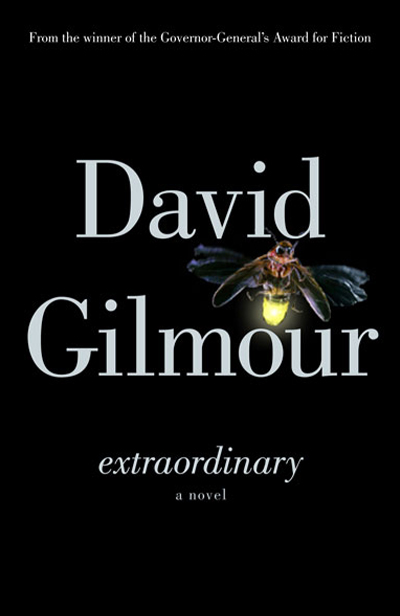
Extraordinary by David Gilmour
What? You didn’t know I had a sister?
Yes, Sally, a half-sister really. She was fifteen years older than me, my mother’s daughter from a turbulent first marriage. I saw her now and again when I was growing up, but probably the difference in our ages, a generation, and the fact that she never lived with us, made her seem more like a sympathetic aunt. She swatted me once, just an impatient cuff on the back of the head, when I was eight or nine—I’d knocked over a flower jar in her kitchen—and I thought, You can’t do that, you’re not my mother. And yet it wasn’t quite like a quarrel with my brother, not on the same level, so to speak, as with a peer.
How you feel about someone when you’re very young, their stature in the world compared with yours, sometimes never changes. Which made certain moments between Sally and me confusing. Especially later on.
By the time I was conscious enough to wonder why things were the way they were, she was already married. How such a lovely creature (long face, dark hair) ended up with a blockhead like Bruce Sanders, I’ll never understand. But I suppose that’s the nature of people, even family: you never really get to know anyone that well, even when they try to explain themselves.
Anyway. For sixteen years, she endured sulks, punishing silences and God knows what kind of lonely moments, until one night she didn’t; and the next day, Bruce Sanders woke up in the guest room of his own house, the evening’s final words thudding between his small ears: “I’m leaving you.”
It may have taken her a while to get there, but when she did, my goodness, she acted with the efficiency of a guillotine. The straightest line between two points. I was only a teenager, but it felt as though I had just had my first glimpse into affairs of the heart: when a woman’s finished with you, she ’s really finished.
With Chloe, her twelve-year-old daughter, in tow (her son stayed at home with Bruce), she took a studio apartment in San Miguel de Allende, a sun-baked town in the mountains north of Mexico City, and resumed her career as a painter—something for which she was gifted but the execution of which had been discouraged by a husband who thought the whole business “unrealistic.” A few weeks later, Sally attended an afternoon cocktail party at a house on the Callejón de los Muertos, tripped on the carpet, smacked her head against the fireplace and broke her neck.
Returning to Toronto on a gurney, she spent six months in rehab and the rest of her life in a wheelchair.
Nice deal, eh? But she was a hearty soul, and even with the wheelchair, the crutches, the falling down here and there, she raised her preteen daughter all but single-handedly. Her ex-husband, Bruce, in a state of ill-disguised pleasure at the hand life had dealt her, said, “Move back in with me,” the implication being, Now that you’re not in the game anymore, now that no one else will take you, you might as well come back.
But no handouts, thank you. Sally and Chloe found a way to live and be happy. As for me, I wasn’t around much, to say the least. Sometimes I’d go up to her apartment in the northern part of the city and drink too much and get her to drink too much and then leave for another year or two. The truth is, I was so distracted with the failure of my own life that it felt as though I didn’t have the time to go out of my way, even momentarily, for anyone else. Although God knows what I was doing instead.
Still, it makes me queasy with regret, even after all these years, to think about it. Because I loved her, I really did. But I was under the assumption that she would always be there, this not-quite-mother, not-quite-sister, that there was no need to tend to it, to look after it like a garden. And then, suddenly, it was too late by years. Simply too late.
Looking back on things, I suppose it’s the reason I did what I did that night, to make up for all those times I glanced toward the top of the city and said fuck it and went about my own business instead.
Do the dead forgive us? I wonder. I hope so. But I suspect not. I suspect they do nothing at all, like a spark flying from a burning campfire: they just go psssst and that’s it. How they felt about you in that last second is where you remain, at least in your thoughts, for eternity. Or rather, until you go psssst too.
—
Excerpted from EXTRAORDINARY by David Gilmour. Copyright © David Gilmour, 2013. Excerpted by permission of HarperCollins Publishers Ltd. All rights reserved. No part of this excerpt may be reproduced or reprinted without permission in writing from the publisher.
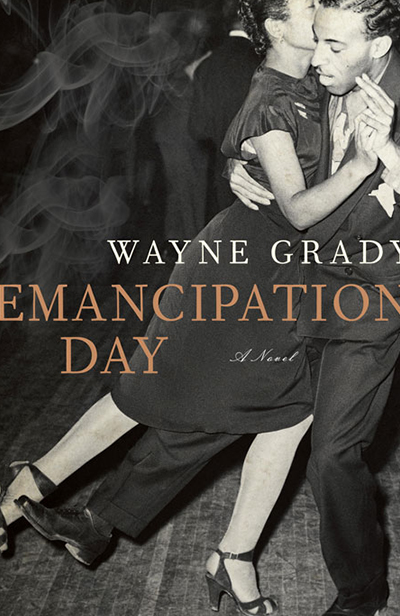
Emancipation Day by Wayne Grady
William Henry Lewis, of W. H. Lewis & Sons, Ltd., Plasterers, Willie to his wife, Will to his brother and friends, the Old Man to his sons, Pop to his daughter, William Henry to his mama who was living in Ypsilanti or Cassopolis, no one was certain where or even if she was still alive, she’d be in her nineties, and also William Henry to himself, sat regally in his father’s ancient barber chair, his hands spread across his knees under the blue pinstriped barber’s bib, and watched himself in the large wall mirror while his brother, Harlan, shaved his chin. Harlan had owned this barbershop off the lobby of the British-American Hotel since the death of their father, Andrew Jackson Lewis, who fell dead from this very chair onto this very terrazzo floor on a hot Saturday in July of 1911, thirty-two years ago now, after a longer than usual bout of drinking during which he had taken to sleeping in the barbershop rather than going home to his wife and family. Harlan lived upstairs in one of the hotel’s smaller rooms, and kept two chairs going even though there was just the one barber, also worked as night watchman at Lansberry’s Pharmacy across the street after six p.m., also played Stepin Fetchit for the hotel’s white manager, also shone shoes out in the lobby if anyone asked him to. There was nothing William Henry loved more than being shaved by his brother Harlan.
William Henry had been coming to the shop every day to have his morning shave and occasionally his hair trimmed since the day after their father’s funeral, a habit that had not altered with his marriage to Josie the year after, nor upon the birth of their three children, despite the many times it would have been more convenient, because of work or the drink, to stay home and shave himself or not be shaved at all. William Henry was vain about this, he knew it, others knew it, too, and said so, but all flesh was vanity, and he liked the routine of it, it was like going to church except that church cost money and his brother never charged him a nickel, nor so much as mentioned money even to remark upon the absence of it. His coming here was a comfort to them both. They’d been doing it too long now for him to say he looked forward to it, it would be like saying he looked forward to breathing, or to the Detroit River flowing past. Thirty-two years was a long time. He tried to think of something he could start now that would go on for thirty-two more years, but he couldn’t think of a thing. Maybe something his son, Benny, could do with him every day, but what? When you came to think of it, there weren’t many things in life you did every day and liked doing.
Harlan talked and William Henry mostly listened or read the Detroit Free Press or the Windsor Daily Star, even though, as he would say if there were another customer waiting, “the Free Press ain’t free and stars don’t come out in the daytime,” now and then grunting when he agreed or disagreed with something he read or his brother said. There was always something new to listen to or read about. These days it was the war. The many coloureds who were migrating north to work in the Detroit armament factories. The many whites who were moving out of downtown Detroit for that very reason. The war was none of his or Harlan’s concern, except that it did affect business.
Folks had worn their hair long during the Depression, Harlan said, almost over their collars, but now that the war was on they seemed to prefer a more military cut, even the civilians, and not just the coloureds. Everyone wanted to look like they just been called up, or would be any day now, or else just got back and wanted everyone to know it. William Henry countered with how the plastering business had picked up, too, what with everyone wanting little one-room apartments in their houses to rent to the new workers, or for when the soldiers returned. He liked the smell of the toilet water Harlan used, and the talcum powder that he sprinkled on the brush before whisking the cut hairs off the back of a customer’s neck. His own hair was thin and wavy, not wiry like some, his brother had no trouble getting even a fine-toothed comb through it, and his skin was light enough that when he did go to church he sat right up at the front and did not look around. He could have been called up for service, but he was too old. Fifty-two. Old as a poker deck.
“What’s that boy of yours up to today, Will?” Harlan said, finishing up a cheek. He lightly touched the underside of William Henry’s chin with the tip of his forefinger, and William Henry tilted his head back so that his brother could get at his throat.
“Benny?” said William Henry. “Same as usual, I guess. Business is slow.”
“I meant Jackson. He helpin’ you out?”
William Henry grunted. He saw Harlan stop and look at him in the mirror, the razor poised in the air like a bandleader’s baton. Harlan favoured Jackson, always had. So did his mother. Jackson was her heart. It was always Jackson this and Jackson that. A person would think Jackson was Harlan’s son, not William Henry’s. The truth was, Jackson was a disappointment. Worse than that, a disgrace.
“He helps some,” William Henry said. “His heart ain’t in it, though.”
“That so.”
“Some people ain’t cut out for hard work.”
“Barberin’s hard work,” Harlan said, as though William Henry had been referring to him. “On your feet all day, breathin’ in little bits of hair. Remember how Daddy got so he couldn’t close the scissors no more, his fingers were so swole up?”
“Yours gettin’ like that?”
“Startin’ to.”
—
Excerpted from EMANCIPATION DAY. Copyright © 2013 Wayne Grady. Published by Doubleday Canada, a division of Random House of Canada Limited. Reproduced by arrangement with the Publisher. All rights reserved.
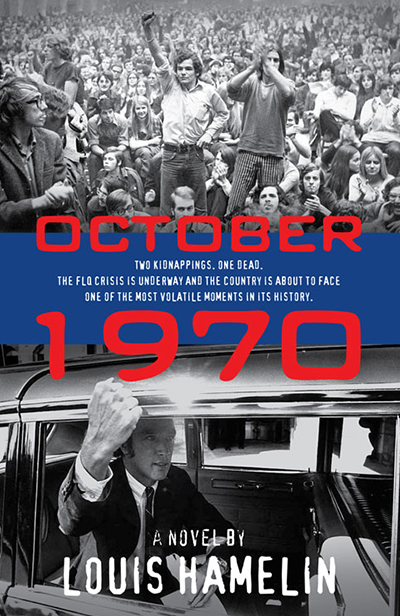
October 1970 by Louis Hamelin, translated by Wayne Grady
Now that I’m on the uphill run, I can see him walking toward me through the cut hay. It’s Coco. And it’s like my heart stops beating. Then it starts again: thoughts, the saliva in my mouth, the family of crows. In a way, I already know what he wants. I look around, nothing but the field bordered by the split-rail fence, the aspens and pines, the sugar bush, above them the thick blue arc of sky, the invisible river at the end of the land. And here, Coco Cardinal trudging across the field, face completely red, glistening with sweat, fat, hunched over, hands paddling the air, winded.
I get down from the tractor, leaving the motor running, and walk toward Cardinal, who has stopped a short distance from me. He’s waiting until I reach him. Squinting into the sun, the light too harsh. As I close the distance, I wipe rivulets of burning sweat from my eyelids and forehead. I stop three feet from where he’s standing. I swallow. I manage a smile.
“Hey, Coco. Been a while . . .”
He shrugs. He’s sweating like a pig, his summer shirt completely unbuttoned and soaked under the armpits. His upper lip glistens, as though his lungs were trying to get out through his nose. His antred eyes want to unglue themselves from his face. Before he opens his mouth to speak, a black fist grips my insides.
“Well, if it ain’t Marcel. They let you out of prison, eh? I hope they rammed a broomstick up your ass first.”
He finds this funny. He giggles. I take another look around, the standing hay is stronger than I am. No one else in sight. My heart pounds in my chest but I hardly hear it. I can barely move. But, as I said, I manage to smile.
“I survived, as you see . . .”
He sneezes once, twice, again and again, his face twitching uncontrollably. Still doing coke, I see. As he sneezes he also seems to be thinking. I wonder if I should take advantage of it, get the jump on him, grab him by the throat and finish him off some way or other. But I let the opportunity pass.
“There’s people say you talk too much. That since you got out you turned into a real chatterbox . . .”
I try to swallow; nothing. He spits on the ground.
“A goddamned stool pigeon!”
He’s not using his normal voice. I try to gesture in protest, but my arm feels like it weighs a ton. With him it’s the opposite: he moves his arm with the lightning speed of a cobra and suddenly there’s a gun at the end of it. I feel the metal rim against my forehead, sucking everything out. My brain melts like a block of ice, useless, nothing else.
“And the other thing, you asshole, is that you stole my wife . . .”
I try to say no, but all I can do is shake my head, not so much because of the cold metal against my skin, although it’s still there. Everything happening to me seems very far away, far from my head, which keeps falling, gently spreading out into the round darkness that pushes back at me harder and deeper, at the centre of my forehead, on my skin beaten by the sun. There’s excitement in his heavy, menacing voice.
“On your knees, Duquet! Now! On your knees in front of me! I’m not gonna say it again . . .”
I let myself fall and it’s like an act of deliverance, I start to say I’m sorry, I want to say it, my eyes raised through a valley of tears, to the muzzle that bores its hole into the silence, this blind full stop in the field, this pitch of forgotten light, of sun, earth, hot. The standing hay and the hay cut down by the reaper. Bewilderment.
The skull makes a cracking sound, like a coconut under the tractor’s rear wheel, followed by a sickening squelch and the grinding of bones and other pulpy bits. Cardinal puts the engine back in neutral, his breath coming in great gasps, and, like an idiot, clutches his legs. A violent spasm has gripped them, thrown them into an interminable shaking fit. With every limb trembling, he forces his left foot down on the brake pedal.
When he’s finished, he jumps to the ground and steps away from the tractor, turns back for a final look feeling almost calm, although his legs are as rubbery as they are after sex. Now he peers critically at the composition of his canvas. He closes his eyes, rubs the lids, opens them again, and takes another look.
He nods. Job well done. Takes a deep breath. Removes a plastic bag from his shirt pocket and, with a length of straw, knocks back a noisy snort of its contents. Then he turns his back on the scene and, for a moment, takes in the panorama of cultivated fields, woodlots, barns painted shades of red from strawberry to dried blood, the glinting silos that stretch from where he is standing to the horizon. Behind him, the tractor is still running. A final glance. There’s no way he can hang around. He decides to get back to the side road via the neighbouring field by following a line of elms and hawthorns and wild apples that can’t be seen from the main road. He reaches the cedar fence, climbs it, balances precariously on the knotty top rail, which is the colour of Appalachian granite sculpted by a century of weather, and remembers an expression, rib fence, what split-rail fences are called in the Baie-des-Chaleurs region. Maritime language.
And Coco loves boats.
—
From OCTOBER 1970 by Louis Hamelin, translated by Wayne Grady. Copyright © 2010 Éditions du Boréal. English translation copyright © 2013 Wayne Grady. Excerpt reproduced with the permission of House of Anansi Press. www.houseofanansi.com. All rights reserved.
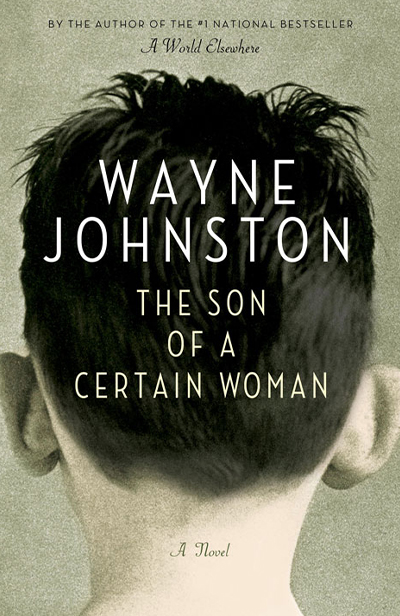
The Son of a Certain Woman by Wayne Johnston
Most of the people who knew my mother either slept with her or wished they had, including me, my aunt Medina and a man who boarded with us; though he was neither old nor someone’s father, he went by the name of “Pops.” I know that’s ambiguous, but it’s better left ambiguous for now. As for me wanting to sleep with my mother, if you disapprove, try spending your childhood with a face that looks long past its prime, with hands and feet like the paws of some prehuman that foraged on all fours—and then get back to me. Or better yet, read on.
It’s hard to describe what your own face looks like. It’s hard to be honest, but it’s also hard, period, because most faces defy description. Mine inspires description. They used to say that the Inuit had a hundred words for snow. That’s about as many ways as my face has been described. Someone once told me it looked as if it had been worked on by an abstract tattoo artist. A boy asked me if my mother had eaten more than the medically recommended amount of beets on the day she had me. Another said that I should wear a mask three hundred and sixty-four days of the year and go outside without one only on Halloween.
You may have seen people with birthmarks like mine. Something like mine, anyway, for mine are at the far worst end of the spectrum. Doctors call them “port wine stains” even though no one, when they see one, thinks of port. They’re also described as strawberry-coloured, even though they’re not. My mother said they call them “strawberry” to “put the best face on it,” then apologized for what she said was an unintended pun.
When asked, I would try to explain that my birthmark was called a birthmark because it was discovered at birth, not because my face was marked by birth, but most people couldn’t let go of the idea that something must have gone wrong as I was being born. My mother said they didn’t like the idea of a fetus that was beet-faced, just lurking there in her womb, waiting to come out and spoil everything, because it made my birthmark seem more like God’s mistake than hers. She added that people didn’t like the idea of fetuses at all, so it was doubtful that one with a face that could stop a clock would change their minds.
For my first two weeks I was thought to have some kind of rare congenital syndrome. What I in fact had was the “benign” version of that syndrome which mimics the real thing for a short while after birth until the most sinister features simply fade away and all that remain are port wine stains and, in my case, oversized hands and feet. The false syndrome is even rarer than the real thing. It’s called False Someone Syndrome. FSS. The “Someone” stands for three someones, three doctors with hyphen-joined last names who convinced my mother and the doctors at St. Clare’s that I was doomed. The more names in front of a syndrome, the worse it is—two hyphens, three names, a syndrome that took three doctors to discover—or invent, as it’s often seemed to me.
The doctors warned of possible “complications” that might manifest as I grew older. The stains, the ones on my face especially, might darken, spread, swell, blister, become infected, require tend-ing to by dermatologists, the nearest of whom was in Halifax, five hundred miles of the North Atlantic away, to the west of St. John’s, which itself is at the far eastern end of the island of Newfoundland.
People like me are apparently just one gene away from some major disability, and we so closely resemble those who have that disability that we are often mistaken at birth as having it. The only way to be sure is to wait to see if the sinister symptoms go away in a couple of weeks.
My mother’s doctor didn’t wait two weeks. He told her I had Someone’s Syndrome, told her I was unlikely to make it through my teens and would have to live in a special home of some kind. But two weeks later—two weeks I spent in hospital—he told her that I had FSS, a kind of “watered-down version” of the syndrome. I had an overabundance of blood-engorged capillaries that, luckily for me, stayed clear of my brain. She told me that when he gave her word of what she called my “reprieve,” she cried more than when she thought I was as good as gone, then sought him out and told him he was a watered-down version of a doctor. She said it wasn’t like finding out that I’d been healthy all along, but as if I’d been dead and had come back to life merely because someone had changed his mind. “I was so happy, Perse,” she said. The doctor seemed oblivious to the change in my mother’s mood, so thrown off was he by her attractiveness. A couple of weeks after having a baby and she looked, he said, like Elizabeth Taylor. My mother pointed to his wedding ring with the finger on which she wore her engagement ring.
Flustered, the doctor then said that he was “thrown off” in his diagnosis of me by the “local gigantism” that was almost always a symptom of the real syndrome—“local gigantism” not meaning that you grow to eight or nine feet tall, but that parts of you are oversized, most often the extremities. In my case, as I said, my hands and feet were—in addition to being stained like my face—larger, which was better than having just one or two toes or fingers that were oversized, as is sometimes the case, and which would have made it necessary for me to have custom-made, and very odd-looking, gloves and shoes.
I know you’re wondering if a certain other part of me was oversized. It wasn’t, but that didn’t stop people from assuming that it was, or speculating, or gossiping about it, and of course it didn’t stop me, once I reached a certain age, from claiming it was oversized.
My large hands looked as though they were stained with blood, front and back, and flopped about—or so it seemed to me—on the ends of my wrists like empty gloves attached by a string lest I lose them. Hairless hands the size of a grown man’s, a butcher’s begrimed and exfoliated by his profession, they might as well have been grafted onto me. They barely fit into the pockets of my slacks and my blazer, and when I withdrew them, my pockets turned almost completely inside out. I always looked as if I were wearing shoes or boots that were far too big for me, boots handed down from a father or much older brother because my parents couldn’t afford to buy me ones that fit. Hands and feet like fins I had, except there was no webbing between the fingers and the toes. My red feet made it look as if I’d stood for far too long in ankle-deep, scalding water. I had a swollen lower lip of the sort associated with a lack of intelligence and that made me speak as if there was still some freezing left from a trip to the dentist’s. What did the people of St. John’s see when they looked at me? A slobbering, jabbering aberration, I suppose, whose mind, character and personality must likewise be aberrant, altered for the worse by whatever “something” had marred me from the moment of my conception, some God-willed conflux of mishaps in my makeup, in the chaos that attended my creation.
That my mother named me before the good news has always made me feel a little as though I bear someone else’s name, that of the poor infant who “lived” for just a few weeks and whose “death” was not mourned but celebrated. Sometimes, perverse though it seems, I’ve found myself feeling sorry, even guilty, about that other, helpless Percy whom I supplanted, Percy the First, whose reign was brief, illusory.
My mother told me she had chosen the name “Percy” before I was born. “Percy” in case of a boy. “I named you after the poet, Percy Bysshe Shelley,” she said. “You came this close to going through life named Bysshe.”
So I missed total catastrophe by a genetic whisker—and wound up with a “watered down” catastrophe. Despite countless reassurances, I worried that this “whisker” in my makeup would wither or be worn away and the real version of the syndrome would be activated. I told my mother I had heard someone say “there’s a first time for everything.”
“It’s just an expression, Perse,” she said. “There isn’t a first time for everything. Most things have never happened and never will.”
“But what if it happens?”
“It can’t happen. It won’t happen. It has never happened and it never will.”
During the first two weeks I’d spent in hospital after I was born, my mother believed that she would never take me home, that I would never speak, that I would be blind, and that my other senses would be almost as badly compromised. She believed that she would visit me in a home as often as she could stand to for however long I had on earth.
And the prospect of all this hit her, she said, just seven months after my father had lit out for what he must have thought was greener grass.
—
Excerpted from THE SON OF A CERTAIN WOMAN by Wayne Johnston. Copyright © Wayne Johnston 2013. Excerpted by permission of Knopf Canada, a division of Random House of Canada. All rights reserved. No part of this excerpt may be reproduced or reprinted without permission in writing from the publisher.
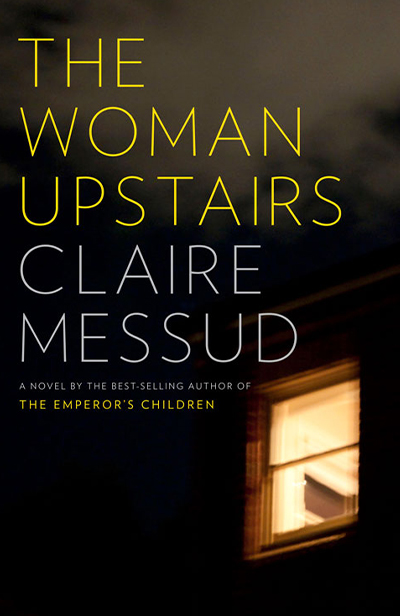
The Woman Upstairs by Claire Messud
I’m a good girl, I’m a nice girl, I’m a straight-A, strait- laced, good daughter, good career girl, and I never stole anybody’s boyfriend and I never ran out on a girlfriend, and I put up with my parents’ shit and my brother’s shit, and I’m not a girl anyhow, I’m over forty fucking years old, and I’m good at my job and I’m great with kids and I held my mother’s hand when she died, after four years of holding her hand while she was dying, and I speak to my father every day on the telephone—every day, mind you, and what kind of weather do you have on your side of the river, because here it’s pretty gray and a bit muggy too? It was supposed to say “Great Artist” on my tombstone, but if I died right now it would say “such a good teacher/daughter/ friend” instead; and what I really want to shout, and want in big letters on that grave, too, is FUCK YOU ALL.
Don’t all women feel the same? The only difference is how much we know we feel it, how in touch we are with our fury. We’re all furies, except the ones who are too damned foolish, and my worry now is that we’re brainwashing them from the cradle, and in the end even the ones who are smart will be too damned foolish. What do I mean? I mean the second graders at Appleton Elementary, sometimes the first graders even, and by the time they get to my classroom, to the third grade, they’re well and truly gone—they’re full of Lady Gaga and Katy Perry and French manicures and cute outfits and they care how their hair looks! In the third grade. They care more about their hair or their shoes than about galaxies or caterpillars or hieroglyphics. How did all that revolutionary talk of the seventies land us in a place where being female means playing dumb and looking good? Even worse on your tombstone than “dutiful daughter” is “looked good”; everyone used to know that. But we’re lost in a world of appearances now.
That’s why I’m so angry, really—not because of all the chores and all the making nice and all the duty of being a woman—or rather, of being me—because maybe these are the burdens of being human. Really I’m angry because I’ve tried so hard to get out of the hall of mirrors, this sham and pretend of the world, or of my world, on the East Coast of the United States of America in the first decade of the twenty- first century. And behind every mirror is another fucking mirror, and down every corridor is another corridor, and the Fun House isn’t fun anymore and it isn’t even funny, but there doesn’t seem to be a door marked EXIT.
At the fair each summer when I was a kid, we visited the Fun House, with its creepy grinning plaster face, two stories high. You walked in through its mouth, between its giant teeth, along its hot-pink tongue. Just from that face, you should’ve known. It was supposed to be a lark, but it was terrifying. The floors buckled or they lurched from side to side, and the walls were crooked, and the rooms were painted to confuse perspective. Lights flashed, horns blared, in the narrow, vibrating hallways lined with fattening mirrors and elongating mirrors and inside- out upside- down mirrors. Sometimes the ceiling fell or the floor rose, or both happened at once and I thought I’d be squashed like a bug. The Fun House was scarier by far than the Haunted House, not least because I was supposed to enjoy it. I just wanted to find the way out. But the doors marked EXIT led only to further crazy rooms, to endless moving corridors. There was one route through the Fun House, relentless to the very end.
I’ve finally come to understand that life itself is the Fun House. All you want is that door marked EXIT, the escape to a place where Real Life will be; and you can never find it. No: let me correct that. In recent years, there was a door, there were doors, and I took them and I believed in them, and I believed for a stretch that I’d managed to get out into Reality—and God, the bliss and terror of that, the intensity of that: it felt so different—until I suddenly realized I’d been stuck in the Fun House all along. I’d been tricked. The door marked EXIT hadn’t been an exit at all.
I’m not crazy. Angry, yes; crazy, no. My name is Nora Marie Eldridge and I’m forty- two years old—which is a lot more like middle age than forty or even forty-one. Neither old nor young, I’m neither fat nor thin, tall nor short, blond nor brunette, neither pretty nor plain. Quite nice looking in some moments, I think is the consensus, rather like the heroines of Harlequin romances, read in quantity in my youth. I’m neither married nor divorced, but single. What they used to call a spinster, but don’t anymore, because it implies that you’re dried up, and none of us wants to be that. Until last summer, I taught third grade at Appleton Elementary School in Cambridge, Massachusetts, and maybe I’ll go back and do it again, I just don’t know. Maybe, instead, I’ll set the world on fire. I just might.
Be advised that in spite of my foul mouth, I don’t swear in front of the children— except once or twice when a rogue “Shit!” has emerged, but only sotto voce, and only in extremis. If you’re thinking how can such an angry person possibly teach young children, let me assure you that every one of us is capable of rage, and that some of us are prone to it, but that in order to be a good teacher, you must have a modicum of self- control, which I do. I have more than a modicum. I was brought up that way.
Second, I’m not an Underground Woman, harboring resentment for my miseries against the whole world. Or rather, it’s not that I’m not in some sense an Underground Woman— aren’t we all, who have to cede and swerve and step aside, unacknowledged and unadmired and unthanked? Numerous in our twenties and thirties, we’re positively legion in our forties and fifties. But the world should understand, if the world gave a shit, that women like us are not underground. No Ralph Ellison basement full of lightbulbs for us; no Dostoyevskian metaphorical subterra. We’re always upstairs. We’re not the mad- women in the attic— they get lots of play, one way or another. We’re the quiet woman at the end of the third- floor hallway, whose trash is always tidy, who smiles brightly in the stairwell with a cheerful greeting, and who, from behind closed doors, never makes a sound. In our lives of quiet desperation, the woman upstairs is who we are, with or without a goddamn tabby or a pesky lolloping Labrador, and not a soul registers that we are furious. We’re completely invisible. I thought it wasn’t true, or not true of me, but I’ve learned I am no different at all. The question now is how to work it, how to use that invisibility, to make it burn.
Life is about deciding what matters. It’s about the fantasy that determines the reality. Have you ever asked yourself whether you’d rather fly or be invisible? I’ve asked people for years, always thinking their answer revealed who they were. I’m surrounded by a world of fliers. Children are almost always fliers. And the woman upstairs, she’s a flier too. Some greedy people ask if they couldn’t have both; and a certain number—I always thought they were the conniving bastards, the power- hungry, the control freaks—choose the vanishing act. But most of us want to fly.
Do you remember those dreams? I don’t have them anymore, but they were a joy of my youth. To confront despair—the dogs at my heels, or the angry man with a raised fist or a club—and have only to flap my arms, rising slowly, directly upward, like a helicopter or an apotheosis, and then soaring, free. I skimmed the rooftops, gulping the wind, rode the air currents like waves, over fields and fences, along the shore, out over the ruffled indigo of the sea. And the light of the sky, when you fly—do you remember that? The clouds like illuminated pillows, close and moist when you ventured into them, and ah! the revelation when you came out the other side. Flying was everything, once.
But I’ve come to the conclusion that it’s the wrong choice. Because you think the world is yours, but really you’re always flying away from something; and the dogs at your heels and the man with the club—they don’t go away because you can’t see them anymore. They are reality. As for being invisible, it makes things more real. You walk into a room where you are not, and you hear what people say, unguardedly; you watch how they move when they aren’t with you. You see them without their masks—or in their various masks, because suddenly you can see them anywhere. It may be painful to learn what happens when you’re behind the arras; but then, please God, you know.
All these years, I was wrong, you see. Most people around me, too. And especially now that I’ve learned that I really am invisible, I need to stop wanting to fly. I want to stop needing to fly. I want it all to do over again; but also I don’t. I want to make my nothingness count. Don’t think it’s impossible.
—
Excerpted from THE WOMAN UPSTAIRS. Copyright © 2013 Claire Messud. Published by Knopf Canada, a division of Random House of Canada Limited. Reproduced by arrangement with the Publisher. All rights reserved.
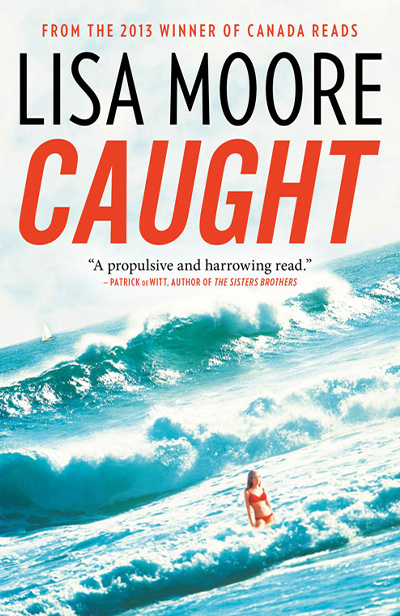
Caught by Lisa Moore
Slaney broke out of the woods and skidded down a soft embankment to the side of the road. There was nothing but forest on both sides of the asphalt as far as he could see. He thought it might be three in the morning and he was about two miles from the prison. It had taken an hour to get through the woods.
He had crawled under the chain-link fence around the yard and through the long grass on the other side. He had run hunched over and he’d crawled on his elbows and knees, pulling himself across the ground, and he’d stayed still, with his face in the earth, while the searchlight arced over him. At the end of the field was a steep hill of loose shale and the rocks had clattered away from his shoes.
The soles of Slaney’s shoes were tan-coloured and slippery. The tan had worn off and a smooth patch of black rubber showed on the bottom of each shoe. He’d imagined the soles lit up as the searchlight hit them. He had on the orange coveralls. They had always been orange, but when everybody was wearing them they were less orange.
For an instant the perfect oval of hard light had contained him like the shell of an egg and then he’d gone animal numb and cringing, a counterintuitive move, the prison psychotherapist might have said, if they were back in her office discussing the break — she talked slips and displacement, sublimation and counter-intuition, and allowed for an inner mechanism he could not see or touch but had to account for — then the oval slid him back into darkness and he charged up the hill again.
Near the top, the shale had given way to a curve of reddish topsoil with an overhang of ragged grass and shrub. There was a cracked yellow beef bucket and a ringer washer turned on its side, a bald white.
Slaney had grabbed at a tangled clot of branches but it came loose in his hand. Then he’d dug the toe of his shoe in deep and hefted his chest over the prickly grass overhang and rolled on top of it.
He lay there, flat on his back, chest hammering, looking at the stars. It was as far as he had been from the Springhill penitentiary since the doors of that institution admitted him four years before. It was not far enough.
He’d heaved himself off the ground and started running.
This was Nova Scotia and it was June 14, 1978. Slaney would be twenty-five years old the next day.
The night of his escape would come back to him, moments of lit intensity, for the rest of his life. He saw himself on that hill in the brilliant spot of the swinging searchlight, the orange of his back as it might have appeared to the guards in the watchtower, had they glanced that way.
—
From CAUGHT by Lisa Moore. Copyright © Lisa Moore, 2013. Excerpt reproduced with the permission of House of Anansi Press. www.houseofanansi.com. All rights reserved.
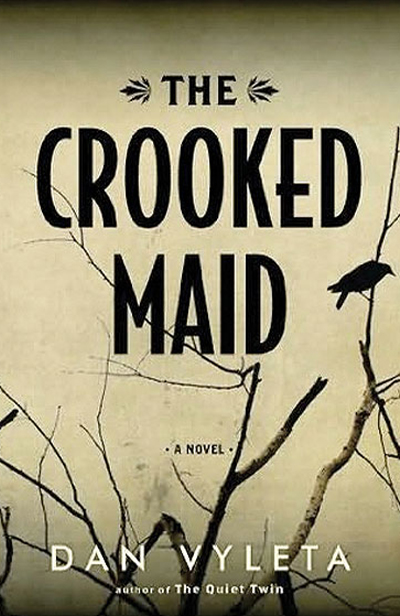
The Crooked Maid by Dan Vyleta
It had been running late since before Nancy and had made several unscheduled stops between Basel and Zurich. Near Innsbruck it broke down altogether, or rather it stopped, and men could be seen running around outside, inspecting the tracks and wheels and shouting at one another. Then it gathered velocity once more, tore along a long, narrow valley before once again coming to a screeching halt. The sun was setting, and a fine, dreary rain was running down the windowpane. Despite the season—it was July already—the compartment grew drafty and cold whenever the train was in motion, then turned close and somehow oppressive when it shuddered to a halt.
She had been on the train now for close to fourteen hours.
During the first hours of their journey the conductor had made a point of stopping by the compartment with great regularity, to offer his services, ply her with a peculiarly sweet yet bitter tea which he dispensed from a blue enamel pot, and to keep her abreast of the reasons for their delay. He was a fat man, doughy, and as though held together by his ill-fitting uniform. Whenever he leaned over to arrange the cushion behind her head or to fuss over the luggage that was hanging in a net above her seat, he left behind the sweaty mark of his plump little hands. Above all he liked to talk. His explanations were as inconstant as his crablike gait. At first he had told “mademoiselle” (as he insisted on calling her, even though she was no longer young, and even though they spoke in German, he in an accent that was broadly Viennese, she with the crisp formality of someone no longer used to the tongue) that the train’s delay was due to the circumstance, “and a rather odd one at that,” that the company had been unable to locate the engine driver in Paris, from where the train hailed. They had found him at last, dead drunk, at a public pissoir not far from the station, sitting on the ground, that is, with his arms wrapped around a plucked and broken-necked goose. All attempts at revival had failed, and at long last it was decided that a replacement had to be found.
An hour later the conductor seemed to have forgotten about the engine driver whose goose he had taken such pains to describe. Now he insisted that a tree had been found lying across the tracks in circumstances that were nothing short of suspicious. To wit, the trees were considered to be located too far from the tracks for it to have been a matter of chance, and besides, the trunk had been cut rather than broken, “and with a proper saw at that.” Twenty miles on, it was the activities of the Swiss officials that were holding up the train. Some papers had been filled in incorrectly and they—“that is, the Swiss”—had called ahead to the next station with instructions to stop the train “whatever the cost.”
Through each of the conductor’s lengthy explanations the woman listened with an air of evident boredom, nonetheless smiling at him and accepting his cups of sweet-yet-bitter tea. Whenever the conductor left the compartment, the woman let lapse this sugary smile and turned her attention back to the boarding school boy who was sitting across from her. He, in turn, never left off staring at her with open curiosity. They had been alone in the compartment for some six hours now and had yet to exchange so much as a word.
There was little about him that was remarkable: a young man dressed in black, with a stiff white shirt and dark, patterned tie, holding a book closed upon his lap. He was perhaps eighteen years of age; too slender yet to be thought of as a man; rich (how else would he be able to afford the first-class ticket?); a boy very pale, with a mask of freckles sitting lightly on his face; the hair nearly black, thick, and falling low into his forehead; the brows long and straight, sloping gently to the temples. There was something wrong with his eye, the one that faced the window and found its own reflection in the darkness of the pane. It looked as though it had been beaten, broken, reassembled. Its white was discoloured and it drooped within its socket, giving a new note to his face, of belligerent reproach. His shoes were made of a shiny black leather and looked as though they had never been worn.
In fact, there was nothing about his person or his clothes that would have marked him as a boarding school boy—he might have been a clerk, or an apprentice undertaker—had not the satchel and cap that were stowed in the netting above his head proclaimed him as precisely that, the student or recent graduate of an institution that thought highly enough of itself to affect a crest with lions and a motto in Ciceronian Latin. He also owned a knapsack and what looked to be a lady’s hat box. At intervals he would stand up on his seat and pull a wrapped sandwich out of the former, then sit eating it with obvious relish. He was tidy and handsome and really quite short.
Darkness fell and the train rattled on. The boy seemed eager to start into conversation but uncertain where to begin. From time to time he would flash her a smile, red-lipped, innocent, and watch her form a smile of her own: grown-up, guarded, graceful, and quick. Once he pulled a sketchbook and pencil from his knapsack and sat as though he wanted to draw her, then flushed and tore out the page. The pencil he wedged behind his ear, where it hung for some minutes before coming loose and falling on the seat next to him. He grabbed it, smiled, put it in his pocket, then found it made a bulge in his pressed trousers, produced it again, and balanced it on the half inch of ledge beneath the window, from where it was sure to fall when they reached the next bend. His fingernails, she noticed, were freshly pared, and he had not undone a single button on his collar. There was a callus on his middle finger such as is formed by the routine use of a pen; and a small red pimple where nose tucked into cheek. That, and his eye was broken at the socket; bled its iris into the white.
The woman found it hard to stop looking at this eye. It was much older than the rest of him, a mark of violence on his pretty, lively face; did not spoil it, nor yet set off its beauty, but sat instead like a fragment of some other face that had risen to the surface. He seemed to have no control over the lid. It would slide shut from time to time, droop across the waking eye like the line of the horizon, and he would raise one hand, making no effort to hide the motion, grab hold of his thick lashes, pull back the lid and stuff it into its fold under the bone. He’d smile then, and she’d grow conscious of her staring, so obvious under the boy’s observant gaze; would catch herself and make an effort to look away. But within minutes her eyes had returned to his, the broken eye, and she found herself wondering whether it had any life.
“I got into a tussle.”
He spoke abruptly, without introduction, the voice high and quiet, pink tongue tapping against teeth.
“Excuse me?”
“A tussle,” he repeated, leaning forward, his hands spread on his knees.
“Almost a fight, actually, with a boy in my class. That’s why it looks so funny. There’s something about it. Nerve damage. The doctors say it will never really heal. But all the same I see just fine.”
He leaned back, pleased to have broken the ice, so much so that he even laughed out loud, a quick, high chuckle, good-humoured and young.
“Did you win?” she asked, after a pause.
“Win?”
“Your tussle.”
He shook his head and smiled: ruefully, cheerfully, unperturbed in his good humour. “You know, I very nearly did. I was surprised myself. The boy was much bigger than I. But then, I’ve always been good at games.”
“Good at games. Football, I suppose.”
“Tennis,” he smiled, and pointed to the handle of a racket sticking out of his knapsack. “School champion three years running. And you?”
“I?” She laughed. “I’m nearly forty—too old for games. But what a queer little fellow you are!”
Not in the least offended by this appraisal, the boy quickly joined her in her laughter, held out his palm and introduced himself as “Robert, Robert Seidel.”
She shook his hand and offered no name of her own.
—
Excerpted from THE CROOKED MAID by Dan Vyleta. Copyright © Dan Vyleta, 2013. Excerpted by permission of HarperCollins Publishers Ltd. All rights reserved. No part of this excerpt may be reproduced or reprinted without permission in writing from the publisher.

Minister Without Portfolio by Michael Winter
I’m leaving you now can you please leave.
But I love you, he said.
He was quite proud of how he said it. He did not know he would begin a response with the word “but.” He hadn’t punched a piece of furniture or raised his voice and now he said this short sentence with mercy and with confidence and honour. It might have been the voice of a messiah, the little messiah that runs each of our lives. The statement was reassuring and he could tell it had some effect. But they were broken and she knew he was a good man but who can push through the hard times of the mundane life any more? The idea of not enough on the line, he could absorb that. But she had dismounted from the horse they were both riding. One of the things she said was she wanted to live a dangerous life.
He found his construction boots and bent his toes so the joints creaked and said so long in his head, not out loud, it would have been too casual. Also, he caught himself and understood that the previous words were the best words to leave on. But I love you. They would give him the high ground and he could really dig a good ditch for himself now and remain unshaven and unwashed and drink himself into a narrow hallway with no door at the end, he could do that and search for commiseration.
It was bright out, a very happy afternoon in the autumn.
Astonishing. He put his heart on a little branch, hung it there, and then almost skipped into the street. He knew that if she was watching, that little hop would not be very attractive. But he was cleaving himself in two, something he did often for sentences at a time, but not for long days or weeks and that is how he spent his time now, split apart. A stacked cord of wood that should have been a tree.
Luckily he lived in a town that was built around a harbour and Nora’s house was on top of a hill, so he had an easy walk down to the bars on Water Street. The roofs of buildings swallowed the hill and he would not have to walk past her house all the time if he just stayed downtown. That is the logic people use when they discover themselves drinking intensely. He had lived down here just after trade school in a one-room apartment on Colonial Street. He paused at the window now and the door where his mail used to come—his life before Nora.
He found himself in one bar called the Spur and a man in a corner was singing a country song which filled Henry with loathing. The man had no right to pollute the air with that song, a song from Nashville that understood nothing of a real life. He knew the man, of course, had spoken to him perhaps three times.
Henry ate a pickled egg and chewed through the overboiled cold and dull yolk and drank down a pint of pale ale and came around on the song. Stripped of the production Henry was applying to the vocalization, the core of the song was ultimately true and as he left the bar he patted the old man on the shoulder. He was humming it now, Henry was. There was a line at the end where a man cuts off his lover’s head and kicks it against the wall. He sang it the way the old man sang it and walked down further towards the polluted harbour and stared up at the green and marble monument to the war dead. The men up there with their bayonets and loose helmets and kneeling and dying and forever enjoying their patina. Was it brass? No one rubbed the nose of a soldier on a memorial for good luck. Live a dangerous life. There was the dark harbour to end his land activity. The sleeping marine transports servicing the offshore industry and a coast guard search and rescue vessel and a military tug of some kind. Pure utilitarian boats all moored on very thick hawsers. He stared at the serious hulls, empty of men, and saluted. The stink of cooked diesel. Perhaps there is something here, he thought.
The thought of war, or not war but an expulsion from civilian life. Or the hell with it, there is something noble in servicing oil rigs. Oil will be the end of mankind but to be in service of it is not without honour. What was it John’s son had told him? Oil was the bones of dinosaurs. Civilization was something Henry had not chosen. He was born into good manners and a life sheltered from death. He could renounce it. What had it given him? What were the benefits but a broken heart?
—
Excerpted from MINISTER WITHOUT PORTFOLIO by Michael Winter. Copyright © Michael Winter, 2013. Excerpted by permission of Penguin Canada Books Inc. All rights reserved. No part of this excerpt may be reproduced or reprinted without permission in writing from the publisher. All rights reserved.
2013 Jury
The Scotiabank Giller Prize is pleased to announce the award-winning, three-member jury panel for the 2013 Prize.

Margaret Atwood
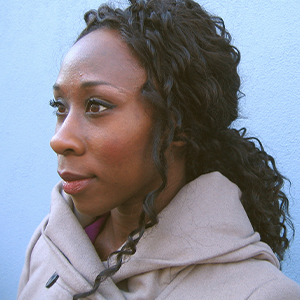
Esi Edugyan
